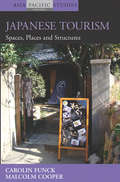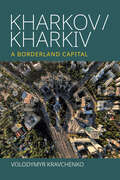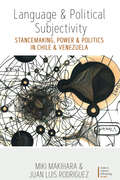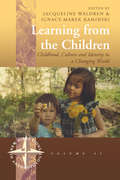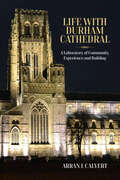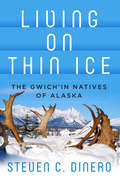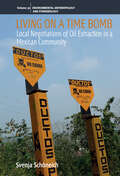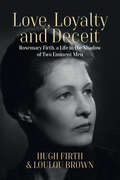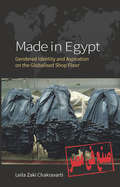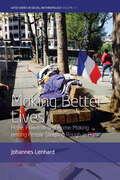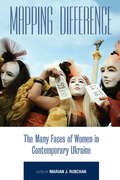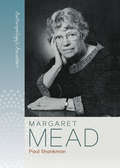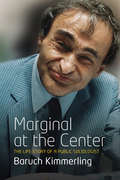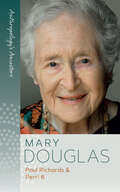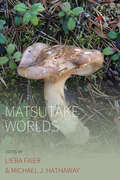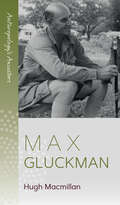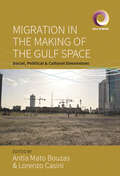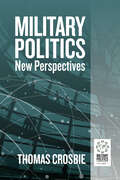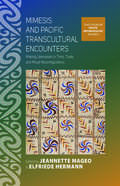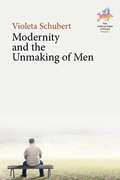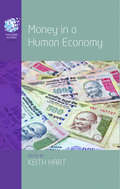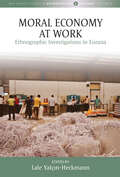- Table View
- List View
Japanese Tourism
by Malcolm Cooper Carolin FunckThe changing patterns of Japanese tourism and the views of the Japanese tourist since the Meiji Restoration, in 1868, are given an in-depth historical, geographical, economic and social analysis in this book. As well as providing a case study for the purpose of investigating the changing face of global tourism from the 19th to the 21st Century, this account of Japanese tourism explores both domestic social relations and international geographical, political and economic relations, especially in the northeast Asian context. Socio-cultural and geographical analysis form the research framework for the book, in three ways: first, there is an emphasis on scale as tourism phenomena and their implications are discussed both in a global context and at the national, regional and local levels; second, the discussion is informed by primary data sources such as censuses and surveys; and third, the incorporation of fieldwork and case studies adds concreteness to the overall picture of Japanese tourism. This book is a significant addition to an area of study currently under-represented in the literature.
Kharkov/Kharkiv: A Borderland Capital
by Volodymyr KravchenkoKharkiv is Ukraine’s second largest city and its former capital. Situated within 40 km of the Ukrainian-Russian border it is one of those East-Central European “liminal” cities which became a center of modernization and pluralization in the borderland area, playing a prominent role in the process of nation building. Volodymyr Kravchenko’s expanded edition of Kharkov/Kharkiv, now in the English-language and including a new chapter on the reconfiguration of the Ukrainian-Russian borderland during and after the watershed Euromaidan event, uniquely uncovers the city’s long history, from the 17th century to today. Addressing issues of regional and national identities, Ukrainian-Russian relations, mental mapping, historical narratives and the ensuing de/reconstruction of national mythologies, this book, fills a unique gap in the literature on Kharkiv.
Language and Political Subjectivity: Stancemaking, Power and Politics in Chile and Venezuela (Studies in Linguistic Anthropology)
by Miki Makihara Juan L. RodríguezPolitics and power are understood as interconnected yet opposed forms of agency that do not exist without each other and depend on transgressions and the upholding of social boundaries. Language and Political Subjectivity is an ethnographic and historical piece of research that considers how Indigenous and diasporic communities, with their political subjectivities, expand over significant sociohistorical changes, debates, and struggles in the transformation of Chilean democracy and Venezuela’s Bolivarian Revolution. It offers an innovative approach to stancemaking as a rhetorical semiotic process that produces truth, beliefs, and certainties about social realities and relations.
Learning From The Children
by Ignacy-Marek Kaminski Jacqueline WaldrenChildren and youth, regardless of their ethnic backgrounds, are experiencing lifestyle choices their parents never imagined and contributing to the transformation of ideals, traditions, education and adult-child power dynamics. As a result of the advances in technology and media as well as the effects of globalization, the transmission of social and cultural practices from parents to children is changing. Based on a number of qualitative studies, this book offers insights into the lives of children and youth in Britain, Japan, Spain, Israel/Palestine, and Pakistan. Attention is focused on the child's perspective within the social-power dynamics involved in adult-child relations, which reveals the dilemmas of policy, planning and parenting in a changing world.
Life with Durham Cathedral: A Laboratory of Community, Experience and Building
by Arran J. CalvertAn ethnographic account of daily life in Durham Cathedral, this book examines the processes of negotiation and change between a community and their cathedral. Focusing on the role of sound, light, time, space, building and dwelling, the author argues that Durham Cathedral is much more than just cannot merely be a backdrop to everyday life. Rather, through the constant processes of negotiation and change, it is a fully engaged participant in the daily lives of those who use Durham Cathedral. As such, it is not a place in which life happens, but a place with which life happens.
Living on Thin Ice: The Gwich'in Natives of Alaska
by Steven C. DineroThe Gwich'in Natives of Arctic Village, Alaska, have experienced intense social and economic changes for more than a century. In the late 20th century, new transportation and communication technologies introduced radically new value systems; while some of these changes may be seen as socially beneficial, others suggest a weakening of what was once a strong and vibrant Native community. Using quantitative and qualitative data gathered since the turn of the millennium, this volume offers an interdisciplinary evaluation of the developments that have occurred in the community over the past several decades.
Living on a Time Bomb: Local Negotiations of Oil Extraction in a Mexican Community (Environmental Anthropology and Ethnobiology #30)
by Svenja SchöneichProviding a holistic understanding of extensive oil extraction in rural Mexico, this book focuses on a campesino community, where oil extraction is deeply inscribed into the daily lives of the community members. The book shows how oil shapes the space where it is extracted in every aspect and produces multiple uncertainties. The community members express these uncertainties using the metaphor of the time bomb. The book shows how they find ways to "live off the time bomb" by using mechanisms of short-term coping and long-term adaptation and thus, developing the capability to determine their lives despite the ever-changing challenges.
Love, Loyalty and Deceit: Rosemary Firth, a Life in the Shadow of Two Eminent Men
by Hugh Firth Loulou BrownHow much do we really know about our parents’ lives? What secrets lie in plain sight? This is the true story of hidden love within a small circle of some of the most acclaimed anthropologists of the 20th century. Told by Rosemary and Raymond Firth's son, and the daughter of Celia and Edmund Leach, the man Rosemary loved all her life, this part love-story, part biography, part social history is the tale of a highly influential circle of social anthropologists in Britain from the 1930s, through the Second World War, to the end of the century. The book explores their early influences, their insecurities, their flaws, struggles and achievements. It is a story of passion and commitment, but also of deceit and betrayal, including the inexplicable disappearance, death and alleged murder of a very close friend. It also narrates Rosemary's struggles for emotional and intellectual independence in the face of societal expectations of women and her own guilt, loss and self-doubt. From the Prologue: Rosemary loved many people in many different ways, but she loved two men in particular throughout most of her life. One was her husband, Raymond Firth, regarded by some as among the founding fathers of social anthropology. Yet she also retained a passionate devotion to her first love, Edmund Leach, who would subsequently become the public intellectual face of social anthropology in the later 1960s. Both separately and together they were part of the process of defining the nature of this still growing discipline in the first part of the mid-twentieth century.
Made In Egypt: Gendered Identity and Aspiration on the Globalised Shop Floor
by Leila Zaki ChakravartiThis ground-breaking ethnography of an export-orientated garment assembly factory in Egypt examines the dynamic relationships between its managers - emergent Mubarak-bizniz (business) elites who are caught in an intensely competitive globalised supply chain - and the local daily-life realities of their young, educated, and mixed-gender labour force. Constructions of power and resistance, as well as individual aspirations and identities, are explored through articulations of class, gender and religion in both management discourses and shop floor practices. Leila Chakravarti's compelling study also moves beyond the confines of the factory, examining the interplay with the wider world around it.
Making Better Lives: Hope, Freedom and Home-Making among People Sleeping Rough in Paris (WYSE Series in Social Anthropology #11)
by Johannes LenhardIn this ethnographic study, Johannes Lenhard observes the daily practices, routines and techniques of people who are sleeping rough on the streets of Paris. The book focusses on their survival practises, their short-term desires and hopes, how they earn money through begging, how they choose the best place to sleep at night and what role drugs and alcohol play in their lives. The book also follows people through different institutional settings, including a homeless day centre, a needle exchange, a centre for people with alcohol problems and a homeless shelter.
Making Better Lives: Hope, Freedom and Home-Making among People Sleeping Rough in Paris (WYSE Series in Social Anthropology #11)
by Johannes LenhardIn this ethnographic study, Johannes Lenhard observes the daily practices, routines and techniques of people who are sleeping rough on the streets of Paris. The book focusses on their survival practises, their short-term desires and hopes, how they earn money through begging, how they choose the best place to sleep at night and what role drugs and alcohol play in their lives. The book also follows people through different institutional settings, including a homeless day centre, a needle exchange, a centre for people with alcohol problems and a homeless shelter.
Mapping Difference: The Many Faces of Women in Contemporary Ukraine
by Marian J. RubchakDrawn from various disciplines and a broad spectrum of research interests, these essays reflect on the challenging issues confronting women in Ukraine today. The contributors are an interdisciplinary, transnational group of scholars from gender studies, feminist theory, history, anthropology, sociology, women's studies, and literature. Among the issues they address are: the impact of migration, education, early socialization of gender roles, the role of the media in perpetuating and shaping negative stereotypes, the gendered nature of language, women and the media, literature by women, and local appropriation of gender and feminist theory. Each author offers a fresh and unique perspective on the current process of survival strategies and postcommunist identity reconstruction among Ukrainian women in their current climate of patriarchalism.
Margaret Mead: Anatomy Of An Anthropological Controversy (Anthropology's Ancestors #1)
by Paul ShankmanTracing Mead’s career as an ethnographer, as the early voice of public anthropology, and as a public figure, this elegantly written biography links the professional and personal sides of her career. The book looks at Mead’s early career through the end of World War II, when she produced her most important anthropological works, as well as her role as a public figure in the post-war period, through the 1960s until her death in 1978. The criticisms of Mead are also discussed and analyzed. This short volume is an ideal starting point for anyone wanting to learn about, arguably, the most famous anthropologist of the twentieth century.
Marginal At The Center: The Life Story of a Public Sociologist
by Baruch KimmerlingA self-proclaimed guerrilla fighter for ideas, Baruch Kimmerling was an outspoken critic, a prolific writer, and a "public" sociologist. While he lived at the center of the Israeli society in which he was involved as both a scientist and a concerned citizen, he nevertheless felt marginal because of his unconventional worldview, his empathy for the oppressed, and his exceptional sense of universal justice, which were at odds with prevailing views. In this autobiography, the author, who was born in Transylvania in 1939 with cerebral palsy, describes how he and his family escaped the Nazis and the circumstances that brought them to Israel, the development of his understanding of Israeli and Palestinian histories, of the narratives each society tells itself, and of the implacable "situation"--along with predictions of some of the most disturbing developments that are taking place right now as well as solutions he hoped were still possible. Kimmerling's deep concern for Israel's well-being, peace, and success also reveals that he was in effect a devoted Zionist, contrary to the claims of his detractors. He dreamed of a genuinely democratic Israel, a country able to embrace all of its citizens without discrimination and to adopt peace as its most important objective. It is to this dream that this posthumous translation from Hebrew has been dedicated.
Marketing Hope: Get-Rich-Quick Schemes in Siberia
by Leonie SchiffauerMultilevel marketing and pyramid schemes promote the idea that participants can easily become rich. These popular economies turn ordinary people into advocates of their interests and missionaries of the American Dream. Marketing Hope looks at how different types of get-rich-quick schemes manifest themselves in a Siberian town. By focusing on their social dynamics, Leonie Schiffauer provides insights into how capitalist logic is learned and negotiated, and how it affects local realities in a post-Soviet environment.
Mary Douglas (Anthropology's Ancestors #4)
by Perri 6 Paul RichardsThis handy, concise book covers the life of Mary Douglas, one of the most important anthropologists of the second half of the 20th century. Her work focused on how human groups classify one another, and how they resolve the anomalies that then arise. Classification, she argued, emerges from practices of social life, and is a factor in all deep and intractable human disputes. This biography offers an introduction to how her distinctive approach developed across a long and productive career and how it applies to current pressing issues of social conflict and planetary survival. From the Preface: The influence of Professor Dame Mary Douglas (1921-2007) upon each of the social sciences and many of the disciplines in the humanities is vast. The list of her works is also vast, and this presents a problem of choice for the many readers who want to get a general idea of what she wrote and its significance, but who are somewhat baffled about where to begin. Our book offers a short overview and suggests why her key writings remain significant today.
Matsutake Worlds (Studies in Social Analysis #12)
by Lieba Faier and Michael J. HathawayThe matsutake mushroom continues to be a highly sought delicacy, especially in Chinese, Japanese, and Korean cuisine. Matsutake Worlds explores this mushroom through the lens of multi-species encounters centered around the matsutake’s notorious elusiveness. The mushroom’s success, the contributors of this volume argue, cannot be accounted for by any one cultural, social, political, or economic process. Rather, the matsutake mushroom has flourished as the result of a number of different processes and dynamics, culminating in the culinary institution we know today.
Max Gluckman (Anthropology's Ancestors #6)
by Hugh MacmillanThis handy, concise biography describes the life and intellectual contribution of Max Gluckman (1911-75) who was one the most significant social anthropologists of the twentieth century. Max Gluckman was the founder in the 1950s of the Manchester School of Social Anthropology. He did fieldwork among the Zulu of South Africa in the 1930s and the Lozi of Northern Rhodesia/Zambia in the 1940s. This book describes in detail his academic career and the lasting influence of his Analysis of A Social Situation in Modern Zululand (1940-42) and of his two large monographs on the legal system of the Lozi. From the Introduction: Max Gluckman was the most influential of a group of social anthropologists who emerged from South Africa during the 1930s into what was essentially a new academic discipline. His description and analysis of events in real time implied a rejection of contemporary social anthropological practice, of the ‘ethnographic present’, and of hypothetical or conjectural reconstructions and an acceptance of the need to study ‘primitive’ societies in the context of the modern world.
Migration in the Making of the Gulf Space: Social, Political, and Cultural Dimensions (Worlds in Motion #11)
by Lorenzo Casini Antía Mato BouzasCombining visual and literary analyses and original ethnographic studies as part of a more general political reflection, Migration in the Making of Gulf Space examines the role of migrants and non-citizens in the processes of settling in the Arab States of the Gulf region. The contributions underscore the aspirational character of the Gulf as a place where migrant recognition can be attained while also reflecting on practices of exclusion. The book is the result of an interdisciplinary dialogue among scholars and includes an original contribution by the acclaimed author of the novel Temporary People, Deepak Unnikrishnan.
Migration in the Making of the Gulf Space: Social, Political, and Cultural Dimensions (Worlds in Motion #11)
by Lorenzo Casini Antía Mato BouzasCombining visual and literary analyses and original ethnographic studies as part of a more general political reflection, Migration in the Making of Gulf Space examines the role of migrants and non-citizens in the processes of settling in the Arab States of the Gulf region. The contributions underscore the aspirational character of the Gulf as a place where migrant recognition can be attained while also reflecting on practices of exclusion. The book is the result of an interdisciplinary dialogue among scholars and includes an original contribution by the acclaimed author of the novel Temporary People, Deepak Unnikrishnan.
Military Politics: New Perspectives (Military Politics #1)
by Thomas CrosbieBringing together new research by leading scholars, this volume rethinks the role played by militaries in politics. It introduces new theories of military politics, arguing against the inherited theories and practices of civil-military relations, and presents rich new data on senior officership and on the intersection of military politics and military operations. As the first volume in Berghahn Books’ Military Politics series, it provides a blueprint for a new research paradigm dedicated to tracing how militaries shape their political environments, focusing particularly on the core democratic questions raised by politically-effective (and ineffective) militaries.
Mimesis and Pacific Transcultural Encounters: Making Likenesses in Time, Trade, and Ritual Reconfigurations (ASAO Studies in Pacific Anthropology #8)
by Jeannette Mageo Elfriede HermannHow do images circulating in Pacific cultures and exchanged between them and their many visitors transform meanings for all involved? This fascinating collection explores how through mimesis, wayfarers and locales alike borrow images from one another to expand their cultural repertoire of meanings or borrow images from their own past to validate their identities.
Modernity and the Unmaking of Men (New Anthropologies of Europe: Perspectives and Provocations #1)
by Violeta SchubertResponding to the renewed emphasis on the significance of village studies, this book focuses on aging bachelorhood as a site of intolerable angst when faced with rural depopulation and social precarity. Based on ongoing ethnographic fieldwork in contemporary Macedonian society, the book explores the intersections between modernity, kinship and gender. It argues that as a critical consequence of demographic rupture, changing values and societal shifts, aging bachelorhood illuminates and challenges conceptualizations of performativity and social presence.
Money in a Human Economy (The Human Economy #5)
by Keith HartA human economy puts people first in emergent world society. Money is a human universal and now takes the divisive form of capitalism. This book addresses how to think about money (from Aristotle to the daily news and the sexual economy of luxury goods); its contemporary evolution (banking the unbanked and remittances in the South, cross-border investment in China, the payments industry and the politics of bitcoin); and cases from 19th century India and Southern Africa to contemporary Haiti and Argentina. Money is one idea with diverse forms. As national monopoly currencies give way to regional and global federalism, money is a key to achieving economic democracy.
Moral Economy at Work: Ethnographic Investigations in Eurasia (Max Planck Studies in Anthropology and Economy #8)
by Lale Yalçın-HeckmannThe idea of a moral economy has been explored and assessed in numerous disciplines. The anthropological studies in this volume provide a new perspective to this idea by showing how the relations of workers, employees and employers, and of firms, families and households are interwoven with local notions of moralities. From concepts of individual autonomy, kinship obligations, to ways of expressing mutuality or creativity, moral values exert an unrealized influence, and these often produce more consent than resistance or outrage.
